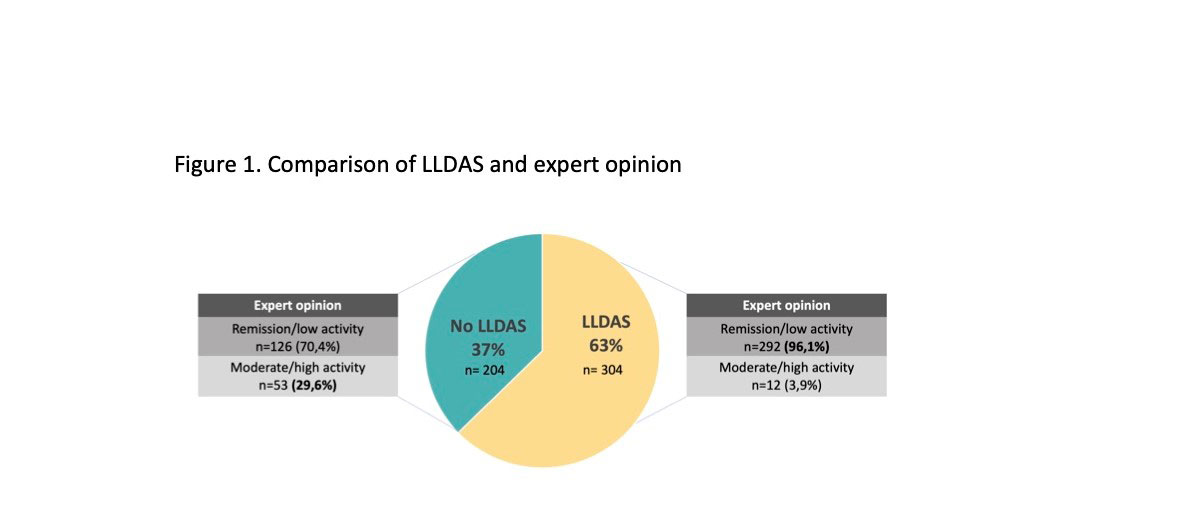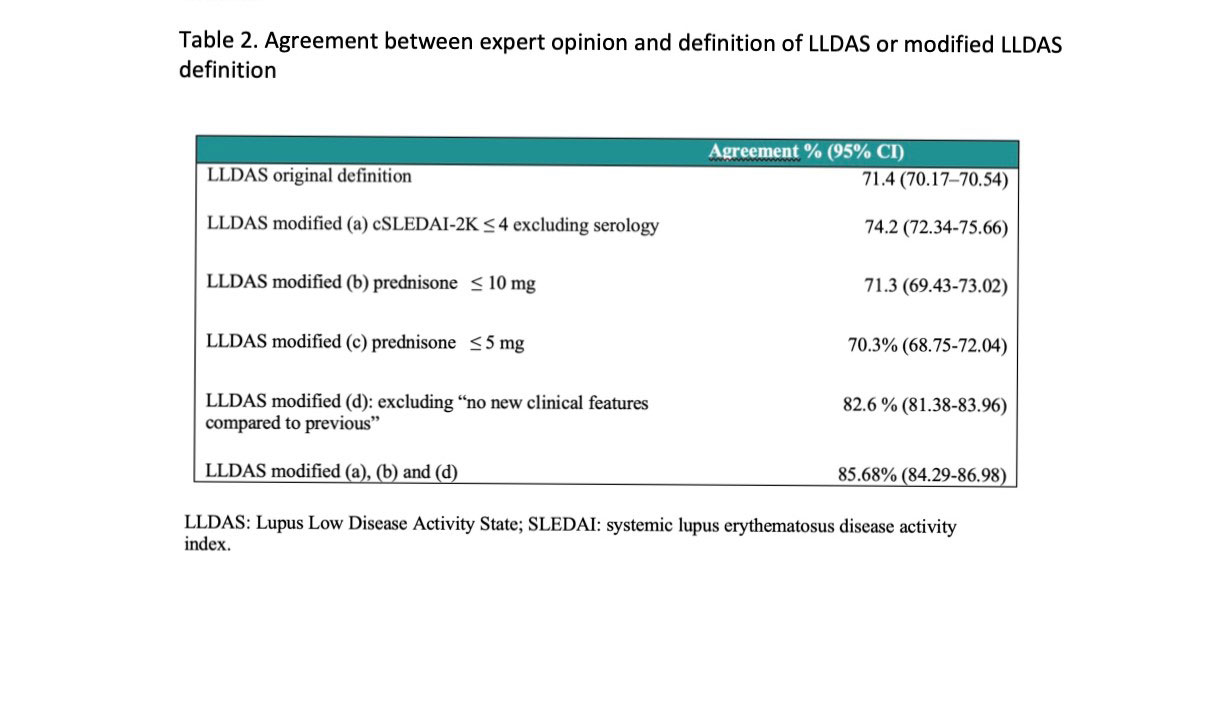Session Information
Date: Sunday, November 13, 2022
Title: SLE – Treatment Poster II
Session Type: Poster Session B
Session Time: 9:00AM-10:30AM
Background/Purpose: Treat to Target strategies are necessary in Systemic Lupus Erythematosus (SLE). They are difficult to establish due to the heterogeneity of the disease. The current definitions of Lupus Low Disease Activity State (LLDAS) according to the Asia Pacific Lupus Collaboration (APLC) and remission according to Definition of Remission in SLE (DORIS) 2021 are difficult to achieve and maintain over time.
To evaluate the concordance between the LLDAS and the clinical status according to the rheumatologist opinion and reasons of disagreement. To explore modifications in LLDAS definition that best fit with the expert´s opinion.
Methods: Prospective multicenter study of SLE patients from 7 Spanish Rheumatology Departments. Statistical analysis: descriptive cross-sectional (at the time of recruitment) analysis of the demographic and clinical characteristics, treatments; remission and LLDAS and the subjective evaluations of SLE activity by the rheumatologist. Analysis of the level of agreement between expert opinion and the definition of LLDAS and its modification were evaluated using Cohen’s kappa.
Results: DEMOGRAPHIC AND CLINICAL CHARACTERISTICS. 508 patients were included. Mean SLEDAI-2K (±SD) was 2.84 (±3.31). 406 (79.9%) patients presented SLEDAI-2K≤4. 317 (74.1%) patients were on antimalarial treatment. 222 (43.7%) patients were on immunosuppressive or biological therapy. 61% of patients weren´t taking glucocorticoids. 7.5% were taking prednisone ≥ 7.5mg/day.
REMISSION/LLDAS 267 (54.4%) patients were in remission and 304 (62.7%) patients were in LLDAS. According to the expert opinion, remission was the most frequent state considered (n=206, 41.6%); followed by low activity (n=153, 30.9%); serologically active (n=71, 14.3%); moderate activity (n=55, 11.1%) and high activity (n=10, 2%) (Table 1).
AGREEMENT Overall agreement between expert opinion and the definition of LLDAS was 71.4 % with a Cohen’s kappa of 0.3. 96.1% in LLDAS were classified by the expert as remission, serologically active or low activity; and 3.9% as moderate or high activity. Of the patients that did not fulfill the definition of LLDAS, 126 out of 179 (70.4%) patients were classified by the expert as remission/low disease activity (Figure 1). The main reasons for discordance were the presence of new clinical features and a SLEDAI 2-K>4. (Table 2)
Conclusion: Almost 2/3 of SLE patients were in remission or in LLDAS. There is a good correlation between LLDAS and the physician’s opinion, particularly for those patients who fulfill LLDAS definition. However, the agreement is not so good for patients who don’t, these being excessively classified by the physician as remission or low activity. The main disagreement items were a SLEDAI-2K >4 and the appearance of different clinical manifestations. On the contrary, PGA adequately fits the LLDAS definition. The modification of the LLDAS definition excluding the comparison with previous assessment increases the agreement with the expert opinion to 82.6%.
To cite this abstract in AMA style:
Mouriño Rodriguez C, Altabas Gonzalez I, Rúa-Figueroa I, Jimenez N, Rubiño F, Hernandez Rodriguez I, Menor Almagro R, Uriarte Isacelaya E, Tomero Muriel E, Salman-Monte T, Carrion Barbera I, Galindo m, Rodriguez Almaraz E, Sousa L, Pego-Reigosa J. Does LLDAS Definition Match the Rheumatologist Opinion? The First Visit Evaluation of a Longinudital Spanish Multicenter Study to Assess Reasons of Disagreement [abstract]. Arthritis Rheumatol. 2022; 74 (suppl 9). https://acrabstracts.org/abstract/does-lldas-definition-match-the-rheumatologist-opinion-the-first-visit-evaluation-of-a-longinudital-spanish-multicenter-study-to-assess-reasons-of-disagreement/. Accessed .« Back to ACR Convergence 2022
ACR Meeting Abstracts - https://acrabstracts.org/abstract/does-lldas-definition-match-the-rheumatologist-opinion-the-first-visit-evaluation-of-a-longinudital-spanish-multicenter-study-to-assess-reasons-of-disagreement/



